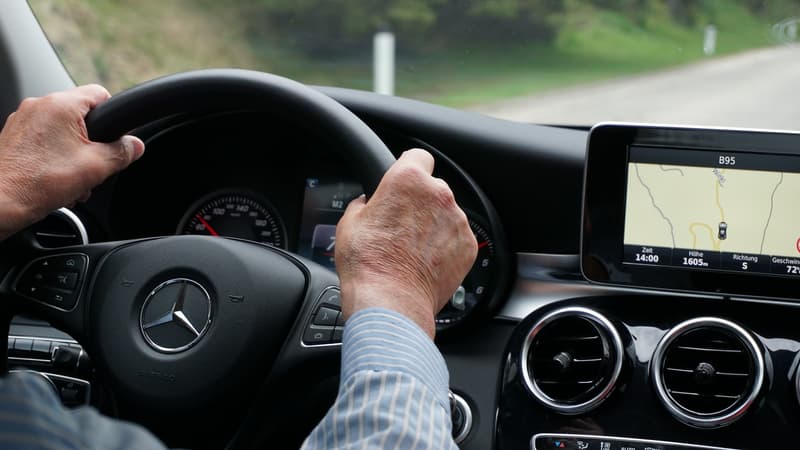HE lifetime driving license Will it soon be a distant memory? The European Parliament is studying, this Wednesday, February 28, the introduction of a possible medical examination aimed at periodically evaluating the driving ability of owners of the precious sesame. A measure designed in particular for older people who see their cognitive abilities diminish over the years, but which in reality concerns the entire population.
While waiting for this possible mandatory medical check-up, what should you do if you witness dangerous driving by one of your loved ones? When should you worry? Getting lost on a normally known route, difficulty parking, an abnormal change in speed, repeatedly…
Several “red flags, warning signs” can accumulate, explains Sylvie Bonin-Guillaume, professor of geriatrics at the University Hospital of Marseille, to BFMTV.com.
The vice president of the French Society of Geriatrics and Gerontology highlights that “most people spontaneously realize their difficulties and stop on their own.”
However, if this is not the case, it is appropriate for the witness to first ask about a possible illness or taking medications that could affect the relative’s ability to drive. TO decree of March 28, 2022 establishes the list of medical conditions incompatible with the car.
1. Demonstrate pedagogy
Regardless of whether it is an illness or not, you need to know if your loved one is aware of this disability. And that is why talk to him about it, in an educational way, Road Safety insists. It is better, for example, to express concern about your safety than to directly question your ability to drive.
“It’s easier to hear ‘I’m concerned about your safety when you’re behind the wheel’ than it is to hear criticism of your driving style,” the Overcoming Alzheimer’s Foundation notes on its website. “Using phrases that include you will further demonstrate your concern for them and give them the space they need to mature their personal thoughts.”
2. Go to your doctor
You can also invite your concerned loved one to contact their treating doctor, in whom they generally have great trust, and support them in this process. The latter will be able to guide you towards appropriate tests or offer you solutions. If your loved one doesn’t want to hear anything, going to their treating doctor can also allow you to broach the topic.
“If there is no support or explanations, telling a loved one that they must stop driving can be considered a sanction, because the car continues to be perceived as a tool of autonomy associated with the feeling of freedom,” analyzes Sylvie Bonin-Guillaume.
3. Encourage driving adaptation
Sylvie Bonin-Guillaume points out that stopping driving can cause depression and isolation. Especially for older people living in rural areas, which often lack an adequate transportation network.
“If the person has to stop driving, it is better to do it little by little, which will be much better than a sudden stop,” insists the geriatrician.
It is possible to adapt the vehicle by choosing, for example, a car equipped with an automatic gearbox or even power steering. Adaptations can also be made to driving, such as avoiding rush hour, driving at night, avoiding long journeys, etc.
Refresher courses, sometimes offered by driving schools, local authorities, mutual insurance companies or insurance companies, can be a solution.
4. As a last resort, inform the prefect.
If after all this a loved one does not want to know anything or their driving difficulties may endanger their lives and the lives of others, they can contact the prefect of the corresponding department.
“A person who considers that one of their loved ones is no longer fit to drive can send a report to the prefect, either by email or by registered mail,” explains Me Aris Sabatakakis, traffic law lawyer at the De Caumont firm. . The prefect is then responsible for summoning the interested party so that he can undergo an examination by an authorized doctor.
If the test is negative, he can appeal to the medical commission for driving licenses, which will make its decision before the prefect. Responsible for making a final decision, you will decide to keep the license as is, issue a license with driving restrictions or withdraw it completely. Anyone, including a third party such as a neighbor, can make this report.
It is also possible to submit a report to the police or gendarmerie, who will be responsible for communicating the information to the prefect.
“When it comes back, it can take several months,” specifies Caroline Tichit, a lawyer in traffic law for more than twenty years, who recommends contacting the prefecture directly.
“Making this report can be a nuisance for family members, so doing it in the form of a certified letter, sent to the prefect, is more discreet and the person can explain that they do not want their identity to be revealed,” he explains. .
The two lawyers emphasize that they have rarely dealt with cases of this type. “These complaints are not that frequent because I think people don’t really know who to contact,” observes Aris Sabatakakis.
Source: BFM TV


